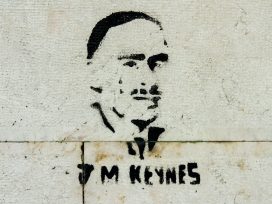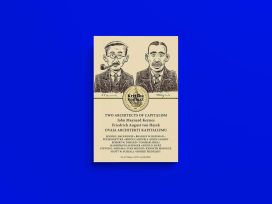Bush, Putin and a shining example of Slovakia
The Bush-Putin summit in Bratislava could make one think that Slovakia is a country without spirit and influence. But Samuel Abrahám turns the attention to another meeting at the eve of the summit. There Slovakia is a shining example. Not because of the Velvet Revolution of 1989 or the peaceful break-up of Czechoslovakia of 1993, and not because it hosted Bush and Putin. It is because of 1998, when Slovakia voted out its own autocrat.
Before 1989 the world was divided into three worlds. The First was democratic, rich, and nuclear. The Second was Communist and nuclear. Within the rules of the Cold War the Second World competed with the First for what was called the Third World, which was poor, non-nuclear, and dependent on assistance and often commanded from Moscow or Washington. The Third World was also described euphemistically as “underdeveloped,” “developing,” or “non-aligned.”
After the fall of the Communist regime in the Soviet Union the Second World simply vanished. Those that belonged to it tried to become part of the First World; those that failed in the attempt ended up in the Third World. In the 1990s there was nothing more degrading for a Russian than if someone called Russia a Third-world country with nuclear missiles. Mafia-infested, crumbling, and with a GDP on par with that of the Netherlands, Russia, however, was in fact very close to being a Third-World country. For many Russians, imbued with a colonial mentality and proud of being the other superpower, this period was not only one of economic misery and the collapse of their empire but also a time of unprecedented humiliation.
A simple way of describing Russian President Vladimir Putin’s efforts in Russian foreign policy is to recreate the Second World. Russia is succeeding in the new constellation while US foreign policy is preoccupied with its own security rather than with the spread of democracy. One should not take too seriously US President George Bush’s incessant talk about the spread of democracy and freedom – it is for domestic US consumption. Although Bush’s second term will also be about repairing relations with the natural allies of the USA, it is security and the war on terror that ultimately determine any important decisions he makes.
The summit in Bratislava revealed that Putin is managing to make a comeback in foreign policy, bringing Russia close to the Soviet “golden age.” After this meeting it is clear that Bush accepts this qualitative change and is acting accordingly. When Bush said at the post-Summit press conference that Russia had a free press and accepted that Russian democracy had some unique features, he was indicating to Putin that he would interfere in Russian internal affairs only verbally. For Bush, Putin is no longer a friend that he will invite to play golf, as he would reward an eager junior partner. No, Putin is a counterpart with whom he must talk business about spheres of influence. And no one of any importance these days is calling Putin’s Russia a developing nation with nuclear weapons.
Putin does not, however, have so many trump cards. Consequently he has to create them artificially for future bargaining. It is not for the money that he is selling missiles to Syria and nuclear material to Iran. Easily negotiated US investment would bring his country more money and much faster. It is instead a deliberate, dangerous superpower game. It is quite likely, however, that for Bush a more assertive Putin is a more suitable partner than some democrat from the Kremlin who would not dare to do business with Syria and Iran but would not be in charge of Russia either.
Although the foreign policy of Putin’s Russia is more stable and predictable, its internal politics remains authoritarian and rough in the typical Russian way. The balance between Putin’s executive power on the one hand and the Duma and the justice system on the other has been lost. Not only are the mass media in the hands of Putin’s lackeys but some Russian journalists are as pandering and submissive as journalists were in Soviet times – as anyone listening to the post-summit press conference could tell.
While it would be possible to call Russia an “illiberal democracy,” Putin would be better described as an “authoritarian democrat.” That term better conveys the paradox that the majority of Russia not only elected Putin but also loves him. His efforts to regain for Russia the dignity it had as an empire, his hard-line on Chechnia, and his having opened a superpower chess game have made him a hero in many Russians’ eyes. The trouble for any autocrat, however, is that it is hard to determine the suitable amount of pressure to exert on the society once he begins to be perceived as being less successful. “The solution” to problems requires increasingly higher doses of manipulation of politics and the mass media in order to remain not only strong but also loved by the majority. If Putin suppresses freedom and the rule of law overly much – something that cannot be maintained too long these days – any subsequent attempt to ease the pressure might be fatal for him. An autocrat is in the greatest danger when attempting reforms; the Praetorian Guard that he himself created has no sympathy for reforms. This will probably be the fate of the Putin era, however long it lasts.
So what good came out of the Bush-Putin summit in Bratislava? What could they have possibly said to each other here that a telephone call, email, or their diplomats could not have sorted out? We may find out from the archive records in forty years but it is quite likely that if Bush meant what he said, then he really did assure Putin that security and terrorism, rather than democracy, are the priority and that his words about spreading democracy should not be taken seriously. And Putin would not have minded that at all.
And how should one assess the summit from the perspective of Bratislava and Slovakia as a whole? The organisation was surprisingly good, the audience was sincerely moved and honoured, and, fortunately, a few demonstrators showed up, which prevented the country from looking like a total anomaly in Europe. And if some people had the feeling that Slovakia is a country without spirit or influence and is waiting on the table of the two bigwigs, they should have been present at the conference on the eve of the summit. They would have heard the words of dissidents and human rights activists who are desperately trying to pull their countries out of the Third World where they ended up after the collapse of Communism. For those people, Slovakia is a shining example, but not because of the Velvet Revolution of 1989 or the peaceful break-up of Czechoslovakia of 1993 or because Slovakia hosted Bush and Putin. It is because of 1998! In that year Slovakia managed through its own efforts, by voting out its own autocrat, to pull itself out of the abyss in which a number of countries still linger.
For many brave men and women in the room, including dissidents from Russia, this seemed like a remote dream. In today’s Bush-Putin constellation these societies must rely solely on their own internal energy. The Ukraine made the first step, also inspired by Slovakia, but many were not at all sure whether their countries had the strength to do it. That is why the spirit and influence of Slovakia is called “annus memorabilis 1998.”
Published 15 March 2005
Original in Slovak
First published by SME, 28 February 2005 (Slovak version)
Contributed by Kritika & Kontext © Samuel Abrahám / Eurozine
PDF/PRINTNewsletter
Subscribe to know what’s worth thinking about.



